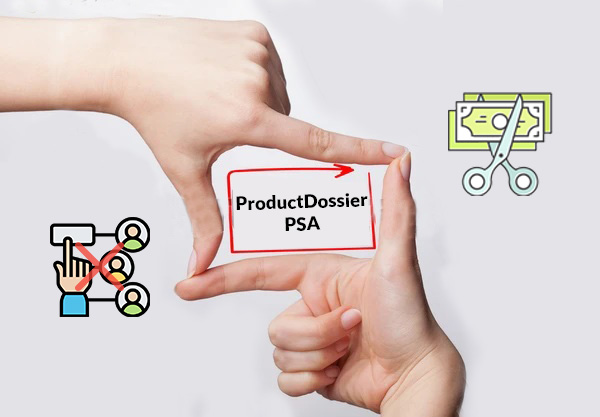A study by McKinsey indicates that most industries are either facing or are expected to face different levels of perceived instability of the business environment. Different types of Professional Services are also expected to face the wrath of the future instability triggered by factors including technology, global competition, regulations, compliance, information security, and others. While organizations must rework their go-to-market strategies and operating models, the role of automation via Online PSA Software appears to be pivotal.
Source: www.mckinsey.com
An Online PSA Software could push professional services enterprises into the future – with relative ease! Before we get there, it is essential that we understand how professional services industry works. There are two key stages that professional services companies go through – Pre-Sales and Project Delivery.
Let us now double-click into each of the phases of the professional services cycle.
Stage # 1: Pre-Sales
a) Pursue ‘right’ opportunities.
Organizations (be it in Consulting, Services, or the IT industry) can pursue only a limited number of opportunities at any given point in time as they are driven by constraints of resources, both people and financial. Gone are the days when potential customers could wait. Today, competitors are armed with better processes and tools. Businesses must act at top speed to evaluate and pursue ‘right’ market opportunities that are more complex than ever.
Organizations cannot rely on spreadsheets and email to get the job done. Further, relying on a COTS (Commercial-Off-The-Shelf) project management software cannot handle your organization-specific needs.
Business leaders must ensure that the process of opportunity qualification and ranking is comprehensive and immaculate so that the decisions are rock-solid. A top-class PSA Software reduces the entire process from weeks to just a few days irrespective of the size, value, and complexity of market opportunities.
b) Proposals must be profitable.
There is no point if organizations go after numerous deals – the key is that every deal must be profitable! The proposal management teams must ensure that the proposals must be very granularly estimated for revenue, costs, and profitability. Further, as the proposals go through multiple iterations, all the revisions must be captured without compromising data integrity.
In the IT industry, consider a software services company pitching for a client project involving software design, deployment, and maintenance for multiple years. Imagine the challenges of accuracy, integrity, and speed of proposal creation!
Again, thinking that a COTS project management software is good enough is akin to facing the risk – blindfold! An Online PSA Software for IT companies equips the proposal management teams with a superior level of templates, processes, workflows, and estimates than any spreadsheet-based approach.
c) Collaborate with project delivery teams.
In the past, the sales teams signed up for customer proposals without consulting the project teams. As a result, organizations experienced severe conflicts between the sales and project delivery teams. In today’s business scenario, proposal management teams can no longer commit to proposals without appropriate level of collaboration with the project delivery teams. On global deals, collaboration involves teams from multiple geographies – phone calls or virtual meetings are not adequate. Collaboration must be seamless at multiple levels including discussions, documentation, commitments, roles, responsibilities, workflows, etc.
An Online PSA Software fosters real-time collaboration across functional teams through clear workflows and transparency.
Stage # 2: Project Planning & Execution
a) Meticulous planning.
While winning a customer project is laudable, the value realization starts with project planning. Depending on the size, complexity, and value of the deal, the project teams have their tasks cut out; they must ensure meticulous planning. Project planning involves multiple dimensions, some of which are listed below.
- Scope documentation and requirements traceability.
- Adoption of predictive, agile, or hybrid project management approaches.
- Creation of a detailed Work Breakdown Structure.
- Defining a project schedule by incorporating task estimations, relationships, lags & leads, and constraints.
- Estimation of resources (people, materials, and financial) and their assignment to deliverables.
- Capturing quality parameters.
- Identifying risks and defining response plans.
- Stakeholder collaboration and communication plans.
b) Flawless execution.
Robert Kaplan & David Norton, who gave us the concept of Balanced Score Cards, discussed in detail on the importance of execution in their subsequent research – Execution Premium. Strategies and plans are important, but execution is the key to value realization. Managing large professional services projects with global teams is a herculean task even for the seasoned project managers.
With a top-rated Online PSA Software, the process of reviewing the project progress, identifying bottlenecks, analyzing variances, recommending preventive or corrective actions is just a click away! With the capabilities of real-time collaboration, project managers find it relatively easy to coordinate work irrespective of the team members’ time zones.
c) Guardrail project profitability.
As mentioned earlier, there is no use to just deliver projects – they must be delivered profitably! For not compromising profitability, project managers must have visibility into planned costs, actual costs, and cashflow regularly and seamlessly; this requires systems to ensure real-time tracking of deliverable progress, milestone completion, revenue recognition, customer billing, and money received.
Imagine a multi-million-dollar project in the IT industry, with a timeline of 18 months that has many scope changes. Ignoring these scope changes would have a direct impact on project profitability as well as cashflow. How does the project team ensure comparison of project baseline and changes – to avoid revenue leakage? An Online PSA Software for IT companies with the capability of automating revenue recognition and invoice generation with deliverable completion is a Godsent for project managers.
While the above dimensions were with respect to a single project, what about rolling up projects to a program level, then to the portfolio level, and finally at the business unit level? Well, here is a glimpse of what a comprehensive PSA Software like Kytes PSA could offer!

My friend, the future of the professional services industry is calling! Are you ready?





